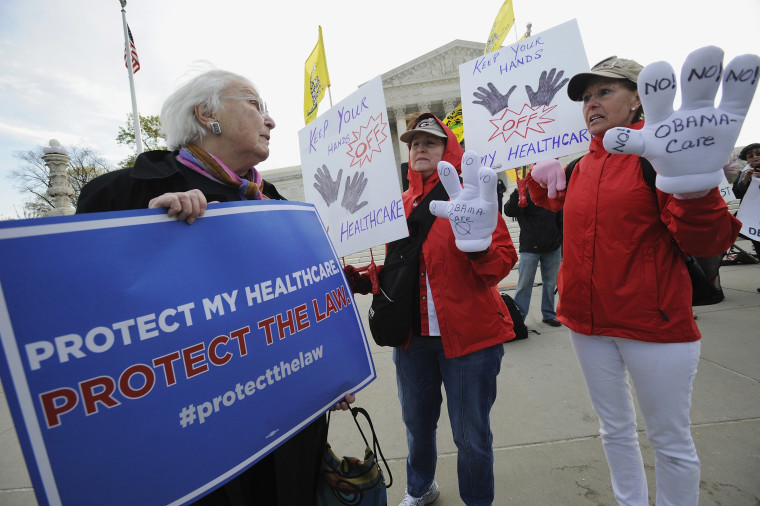There isn't a democracy on the planet in which even conservative candidates take aim at citizens' access to health care. At a certain level, the very idea seems a little silly -- a national candidate would presumably fail if he or she told their electorate, "Vote for me and I promise to leave some of you behind without access to basic medical care."
But the United States is the exception. The Republican Party is the only major party in any major democracy that believes citizens are not entitled to medical care as a benefit of citizenship. Louisiana Gov. Bobby Jindal (R), as we discussed yesterday, wants the GOP to abandon universal coverage as a worthwhile goal.
The Affordable Care Act may have extended new health security to tens of millions of families, but Jindal and Republicans believe voters should elect them to deliberately take that security away.
In theory, this should be a very tough sell. Why in the world would any Americans consider voting, on purpose, for a platform that could deliberately punish their own family?
The answer, I suspect, has a lot to do with the power of fear.
The New York Times recently published a fascinating piece on Kentucky's triumphs in implementing the Affordable Care Act, and the article highlighted a woman named Amanda Mayhew. On paper, the piece presents Mayhew as a classic example of an "Obamacare" success story: thanks to the ACA, she been able to receive free, overdue dental care; she was able to see a dermatologist for free; and she received medication to treat depression for free. This one law has made a big, positive difference in her life.
And then came the twist.
"I don't love Obamacare," she said. "There are things in it that scare me and that I don't agree with." For example, she said, she heard from news programs that the Affordable Care Act prohibited lifesaving care for elderly people with cancer.
Mayhew went on to tell the NYT that she's "thankful" for her coverage, she would "gladly give up my insurance today if it meant that some of the things that are in the law were not in place."
The problem, of course, is that Mayhew has been misled. Despite what she "heard from news programs," the Affordable Care Act does not prohibit lifesaving care for elderly people with cancer. It actually does the opposite -- which is why the law has received the enthusiastic support of the American Cancer Society and AARP.
The Times article featured a well-intentioned woman, whose heart clearly seems to be in the right place, who would sacrifice her own access to medical care in order to scrap provisions in the law that do not actually exist.
And that's where Republican rhetoric comes into play. For years, the naive among us -- a group that I include myself in -- have marveled at the extraordinary lies that have been told about the Affordable Care Act. Why, we ask, would the right lie so brazenly to families who urgently need access to doctors and medicine?
Because dishonesty works. Deceit instills fear and uncertainty.
When Republican candidates vow to gut the American health care system and take Americans' coverage away, there are plenty of voters who are willing to go along because they're eager to undo those horrible provisions in the law they "heard about" on "news programs."
The power of deceptive propaganda, backed by billionaires and their powerful elected allies, shouldn't be underestimated.
The Kaiser Family Foundation recently found that 41% of the country still, even now, believes "a government panel" exists to "make decisions about end-of-life care for people on Medicare." That's two out of every five Americans who believe a ridiculous falsehood.
It's not that these people are bad or dumb. It's not that they want their neighbors or community to suffer. The issue here is that some wealthy and sophisticated folks launched a con job on the public, and the scam roped in a lot of victims.
Why else would politicians run on a platform of pushing millions of Americans into a position where they're one ailment away from bankruptcy? It's because they think they can get away with it -- nice, generous folks will sacrifice their own security to prevent imaginary threats from hurting someone else.
